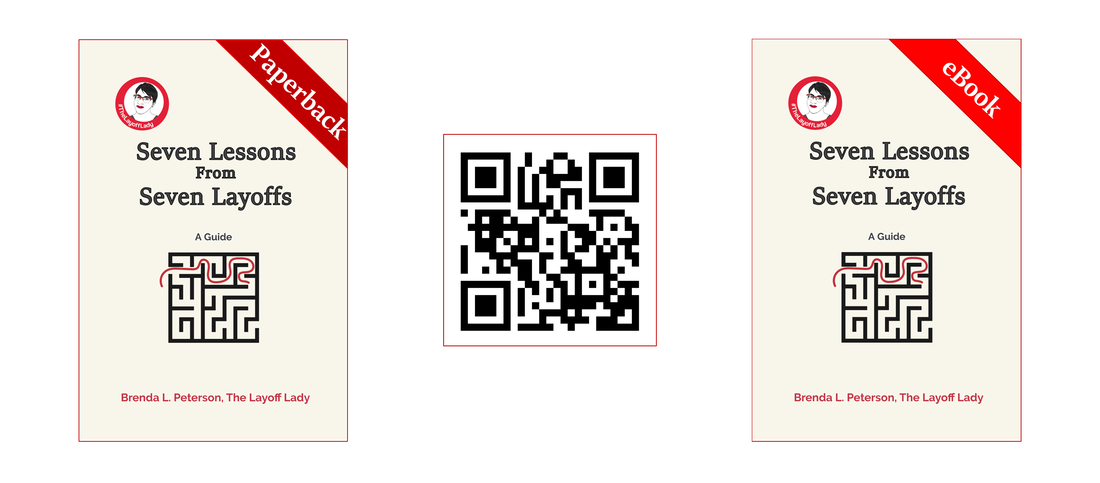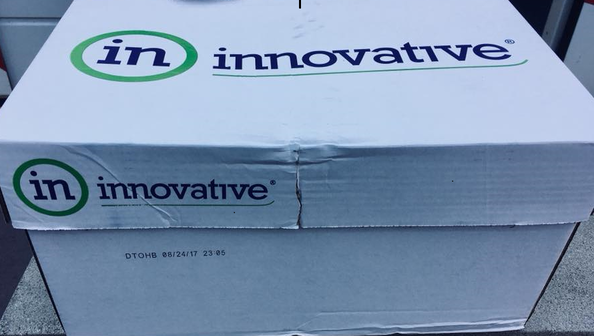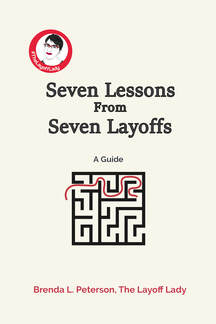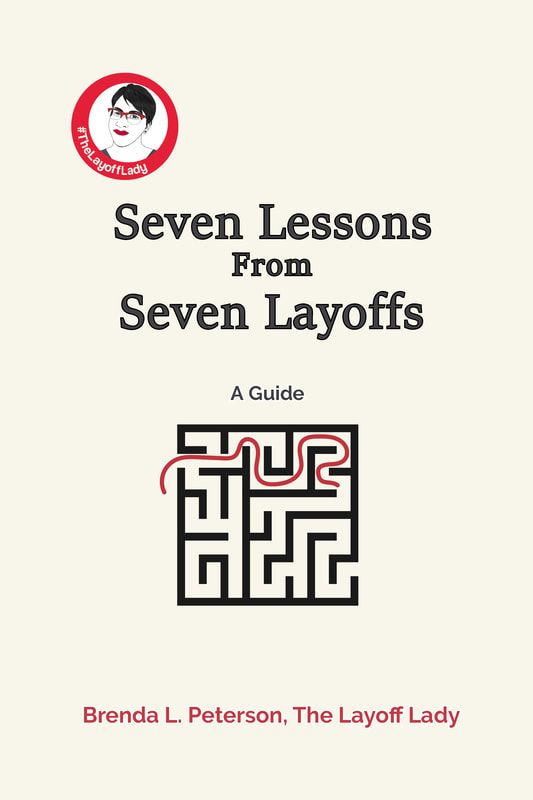|
By Brenda L. Peterson, The Layoff Lady Why I Started The Layoff LadyI remember the good old days when I felt bad for my friend Tricia because she had been laid off four times. When I found myself working through my post-layoff career transition number seven, I decided I needed to do more than just find myself a new professional "day job." I also committed myself to documenting my lessons learned. I wanted to create resources that could benefit others who unexpectedly found themselves unemployed. Out of that decision, The Layoff Lady was born. I share my insights through blog articles, educational sessions, speaking engagements, podcast interviews, and my book Seven Lessons From Seven Layoffs: A Guide. I committed myself to sharing what I had learned to help people on who have been part of a layoff, who are in job transition, and people who want to proactively build their career resilience to help ensure their professional success. About The Seven Layoff LessonsThrough my seven layoffs and many conversations with others in post-layoff career transition, I have learned seven core lessons that can help you navigate this challenging time. If you are in the midst of a post-layoff career transition, these lessons speak directly to the unique challenges you will face as you navigate from layoff day until the first day of your new job. If you're currently employed, but aware that no one is immune to layoffs, these lessons can help you understand the layoff experience and plan ahead just in case it happens to you. Let's briefly review my seven lessons. In future blog articles, I'll expand on each lesson in more detail. Lesson One: Experience your emotions and manage your mindset.Right after a layoff, people often act hastily out of sheer unbridled panic. Instead, you must attend to two key tasks right away: feeling your feelings and choosing your career transition mindset. Getting your head on straight before springing into action will prepare you for the challenges ahead. Lesson Two: Keep your mind on your money (& your money on your mind).Most people work to pay their bills and afford the life they want. Unfortunately, when your job ends, so does your main income stream—and possibly your health insurance, too. Making the right short-term changes can help you weather the storm while also minimizing long-term financial repercussions. Lesson Three: Ask yourself, "What do I want to be next?"Few people take the time to step back from their work life and think, “Is this really what I want to do?” When you go through an unplanned job change, seize this rare opportunity to revisit your career path. Take time for a little structured soul searching and actively decide what you want both long-term and in your next job. Lesson Four: Shape and share your story. Finding a new job is all about you telling the story of your career. You get to shape your professional narrative so you can share your compelling story with colleagues and potential employers. Learning to talk about where you’ve been, your skillset, and where you’re going is powerful. Weaving in company needs with who you are professionally will help you communicate your value more effectively. Lesson Five: Help people help you.It’s hard for many of us to ask for help. If there was ever a time to avoid going it alone, this is it. Overall, people genuinely want to help others through trying times. You can assist them by being mindful of what you need and asking just the right person. Letting people help you will make managing the emotional, logistical, and practical aspects of this career transition easier. Lesson Six: Examine your energy to take control of your time.When it comes to achieving a goal, people often focus on time management. While checking the right items off a task list is valuable, having the energy to do so is often overlooked. Figuring out those right things to do, prioritizing tasks, and factoring in your energy levels will help you sustain your job search momentum for the long haul. Lesson Seven: Assess, adapt, and rise above.Having a plan for success is critical. It is even better to assess how it is going, adapt when needed, and rise above challenges. By anticipating roadblocks and thinking through possible solutions, you can proactively alter your game plan as needed. Learning as you go will help you build resilience and cultivate successful outcomes. For The Whole StoryFor all the information on each of the seven lessons pick up a copy of my book Seven Lessons From Seven Layoffs: A Guide. Learn More
0 Comments
By Brenda L. Peterson, The Layoff Lady Layoffs Happen All The TimeIt starts like any other day. Then, it takes an ominous turn. Whether you were invited to an ambiguously titled last minute meeting, received an awkward email in your personal email notifying you of your last day, or are perp walked to HR on your first day back from vacation, you are now among the newly unemployed. Welcome to the suck. Now What Do I Do?Even if there were buyout rumors, a quarter with low sales, or a new company direction, being part of a reduction in force (RIF) is still surreal when it happens to you. It's hard to know what to do with yourself when you find yourself unexpectedly out of the job. It's time to redirect your attention. Your New Focus AreasThe work problems you had an hour ago are gone. Along with your freed-up future come very different challenges. It’s time to shift to these top three focus areas:
Your Guiding PrincipleAlong with your new focus areas, your overall guiding principle is not to do anything counterproductive (or downright dumb) as you figure out your post-layoff next steps. Your Never-Do List Here are the career-limiting moves that will make your life harder. Instead of springing into action, stop, think, and then just don't do the following:
Your Think-Before-You-Consider-Doing List Here are a few things you may want to do at some point, but that require thought and a plan before you move forward. At the very least, sleep on it before you do any of the following:
Now that you are at least somewhat inoculated against creating utter chaos for yourself, let's get back to those top three focus areas. Focus Area 1: Process Your EmotionsLosing your job can be an emotional roller coaster. An unplanned job change is a stressful life event on par with getting divorced or going to prison. Just like dealing with a death in the family, you’re dealing with the death of the future you thought you had. Losing that imagined future is a significant loss that needs to be addressed. Figure out how you will cope with these changes. While distracting yourself from the unpleasant parts of the process is natural, building healthier coping mechanisms, like prioritizing self-care, is better for your long-term success. While you can get away with avoiding your feelings for a while, eventually, you need to acknowledge each one so you can move on. If you don’t work through those difficult emotions, your ignored feelings will come out sideways at just the wrong time. It is better to work through your grief privately than to fall apart during an interview or snap at someone who is trying to help you. Step 2: Review Your FinancesDisclaimer: While I know quite a bit based on my previous work experience supporting financial coaches, my own research, and my personal life experiences, I do not currently hold a license or certification to give financial advice. Therefore, the information provided here is educational information provided as guidance. I hope you can glean value from my lessons learned. Feel free to take my recommendations or not—but whatever you do, double-check my information (and everyone's facts, for that matter). This is your life, and you will care more about your finances and health care than anyone else. With that, read on. Possible Money From Your Former EmployerAlthough your paychecks will eventually stop, you will receive your final paycheck, possibly vacation time that you have earned and, hopefully, a lovely parting gift from your former employer in the form of a severance package. Severance could be equivalent to a set number of weeks of pay or include an additional lump sum, continuation of some benefits, and job placement services. In most cases, employers do not have to give you any type of severance. If you are eligible for a severance package, you will need to sign something before receiving that money. Once you sign, any thoughts you might have about legal action regarding your employment with the organization are pretty much over. Read the agreement given to you, consider having a lawyer look it over, and ask for clarifications (and any revisions) before signing it. After that, there is typically a waiting period before you receive that money. I also encourage you not just to sign whatever paper they put in front of you. Make sure you advocate for yourself. Unemployment IncomeAfter a layoff, most people will be eligible for unemployment insurance income, or UI. I encourage you to apply for unemployment payments. The money used to make unemployment payments comes from the payroll taxes that employers pay. That money is intended to help people who have been laid off to pay their bills as they search for something new. Unemployment payments are administered at the state level and vary by state. After you apply, there may be a waiting period before you receive a payment. Your state will also outline the amount of each payment you will receive, the number of payments you are eligible to receive, and additional factors impacting your payments. You may also qualify for job search support services and even programs to help you upgrade your skills. In short, apply for unemployment income right away. In most cases, there is not a good reason for most people to forgo unemployment payments. A Note About Health InsuranceSince many people rely on their employers for health insurance coverage, consider how you’ll cover healthcare costs. If you have a spouse, domestic partner, or parent who can bring you onto their health insurance, that may be your best option. Check with the other person’s employer and let them know you no longer have health insurance through your employer because of a layoff. Their employer can talk you through your next steps and cost changes. If that's not an option, consider COBRA coverage through your former employer. This means you could stay with your previous health insurance, but now you'd pay the whole premium cost. Brace yourself when you see your new premium amount because it is usually A LOT more than you spent as an employee. Another option is going on the insurance exchanges at Healthcare.gov to find coverage. You may even be eligible for a subsidy to offset the cost. Alternatively, for less expensive coverage intended to cover a big expensive medical issue should it happen, short-term health care insurance may be a good interim option. Do your research and determine what makes the most sense for you and your household. Step 3: Prepare For Your Job SearchNext, plan to launch your search for a new job. Start by thinking about what kind of job you want. Write down job titles, possible employers, and your target salary range. Update your resume to include details about your last position and showcase your unique skillset as it aligns with your target job. From here, start letting people know your new status of being “in transition” and ask for help. They might be able to introduce you to a valuable business contact, keep an eye out for job openings that meet your needs, and introduce you to a hiring manager looking for someone just like you. It Will All Work Out. It May Also Take A While.All told, I’ve had seven workdays that started with lots of obligations then quickly evaporated into unemployment. The good news is that it will all work out. The bad news is that there is a lot of uncertainty between your last day of work and your first day of your fancy new job when it does arrive. Using these tips will set you right as you begin your career transition. Seven Lessons From Seven Layoffs: A GuideIf you've recently been laid off, check out my book Seven Lessons From Seven Layoffs: A Guide. You can even buy the eBook to get help right now. In this book, I cover seven lessons from my seven experiences with unplanned job losses. I include my personal stories alongside practical advice for navigating this tumultuous time. You'll learn strategies for managing your mindset, finding the next right job for you, shaping your career story, and overcoming setbacks. Learn More |
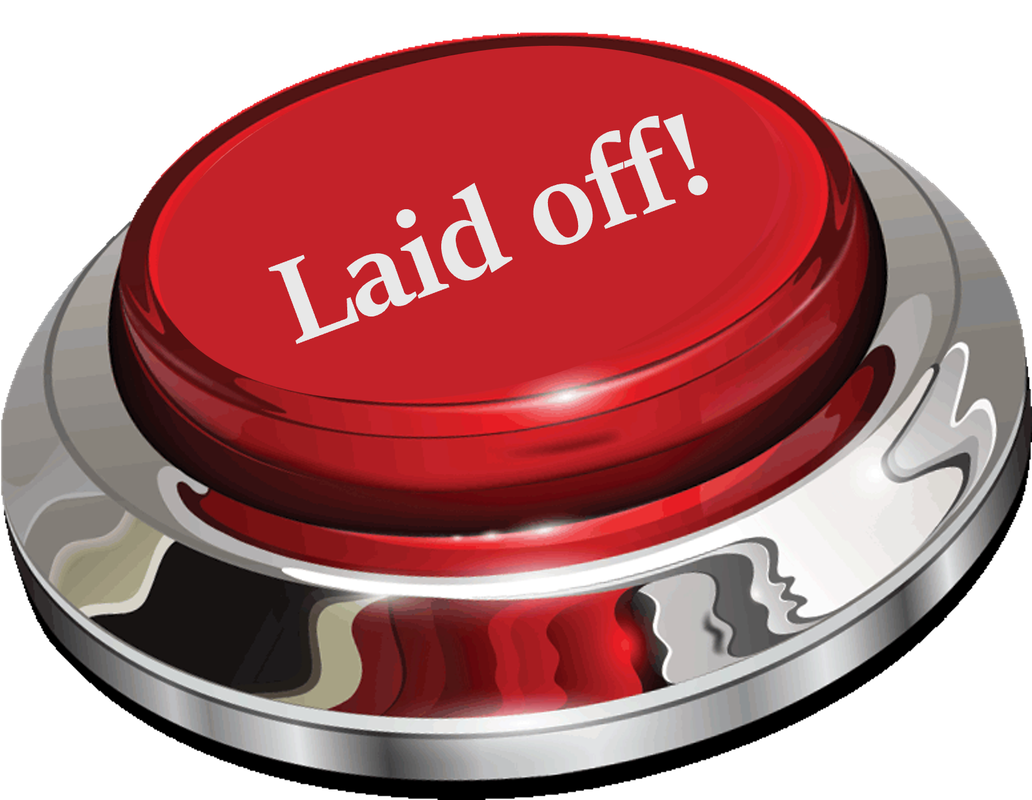
Just get laid off?
Click here for info on what to do first. Author7-time layoff survivor Brenda L. Peterson, The Layoff Lady, waxes poetic on layoffs, job transitions, & career resilience. Buy The Book!Were you recently laid off from your job and need a roadmap for what's next? Pick up a copy of my book, Seven Lessons From Seven Layoffs: A Guide!
Categories
All
Archives
July 2024
|





